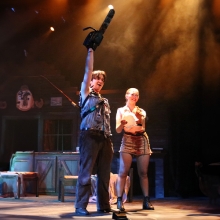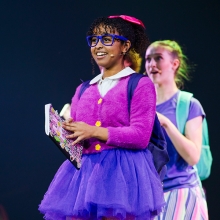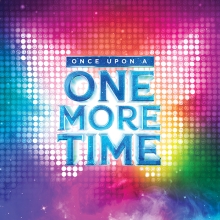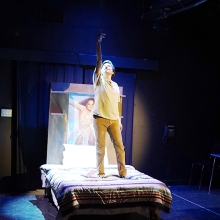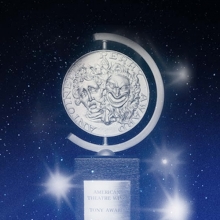During the summer, MTI's office will close at 3 PM ET on Fridays. On Friday, August 30th, the office will close at 1 PM ET for the Labor Day holiday weekend.
These Penguins March to Their Own Beat

These Penguins March to Their Own Beat
At a time when the theatre community is increasingly called upon to be a force for social progress, the Penguin Project serves as a shining example of diversity and inclusiveness.
Founded in Peoria, IL in 2004 by Dr. Andrew Morgan (aka "Dr. Andy"), Professor Emeritus of Clinical Pediatrics at the Illinois College of Medicine at Peoria, the Penguin Project's mission is to "provide an opportunity for children with special needs to develop creative skills related to the theater arts" and "to participate in a community theatre experience."
"Theatre has a way of bringing out the best in people," said Dr. Morgan . "Creating self-esteem, communication skills, socialization. And so, what we do is provide these kids with an opportunity to perform onstage and really bring out the best in them."
The mission has spread beyond Peoria. The program has been so successful that it has spread to "Chapter sites" in 14 states throughout the country. The Penguin Project holds a yearly summit for the Chapter leaders to come together, learn from each other, and give each other support.
"The Penguin Project is social change masquerading as theatre," remarks Morrie Enders, Executive Director of Lincoln Community Playhouse in Lincoln, NE.
"It's overwhelming. You realize that we're all spread out but doing the same thing," says Lindsay Gates, Dr. Morgan's daughter. "And that's crazy - seeing something that started with my family that's grown, and you look around and see other families that have been impacted."
With a love for theatre running in the family, Lindsay Gates initially started as a choreographer for some of the Peoria Penguin show numbers, but now has been choreographing all their productions since 2011. She makes her choreography available to Chapter sites, should they need it. She also serves on the board of directors for the Penguin Project Foundation with a focus on supporting new Chapters as they mount their first productions.
Between all these sites, the Penguin Project has performed nearly the entire Broadway Junior collection of musicals (Annie JR is the reigning favorite). As after-school activities and programs for children with special needs face budget cuts, organizations like the Penguin Project are more necessary than ever before, and need the resources to continue their work. With the shortened show lengths and materials available to assist directors and educators, MTI's Broadway Junior shows have been an essential asset to the Penguin Project.
"Having the Broadway Junior shows have been huge," said Gates.
"The dialogue and the songs are shorter, more precise and more focused without leaving out anything important," added Dr. Morgan. "The quality of the music is top notch and is comparable to live music. Using recorded tracks, though, has the advantage that it is always the same - same volume, same pitch, same tempo. This is really important for our kids, many of whom need the consistency. We also love that there are both rehearsal and performance tracks, so we can teach the music in rehearsals."
The Penguin Project is a merger of two of Dr. Morgan's biggest passions: working with children with special needs and musical theater. Dr. Morgan's own personal experience with community musical theater (he counts Tevye as one his favorite roles that he's played) inspired him to use the art form as a way for children with special needs to engage with others in a collaborative process and to give them a place to feel welcomed.
Dr. Morgan's vision was rewarded last year when the Penguin Project received the 2017 National Arts and Humanities Youth Program Award . This award was given out through a partnership between the National Endowment for the Arts, the National Endowment for the Humanities, the Institute of Museum and Library Services (IMLS), and the National Assembly of State Arts Agencies (NASAA), stating that the Penguin Project "provides high-quality theater education" to youths with special needs.
Under the Penguin Project, performers ages 10-21 enjoy the wonders of putting on a musical in an environment that accommodates them, instead of the other way around. Each performer is paired with a "mentor" who is there to guide and support them through the process of putting on the show.
"Going into it, the mentor is the helper for the artist, but both end up gaining from the relationship," said Peggy Kaney, director of a Tahlequah, OK Chapter production of Annie JR. last June.
Essential to the Penguin Project, mentoring is serious work and an especially serious time commitment. The mentors are usually in high school, and choose to spend several months with Penguin instead of other extracurricular activities. Whether during rehearsal or performances, the mentors must be with their assigned artist at all times and help them prepare for the show.
"When they're at the theater, they're at work. They have a job to do," explains Gates. "They have to stay with their artist. When their artist isn't onstage, they have to keep them busy. That mentor's job is to have the artist be where they're supposed to be."
For Jackie Gunderson, who directed James and The Giant Peach JR. in Normal, IL (also last June), the mentors are invaluable.
"I have a lot of favorite parts about Penguin Project, but the mentor system is my favorite," said Gunderson. "And these mentors sign up for this four-month process knowing that by the end, their goal is to be as invisible and as unneeded as possible. They put all their energy into making someone else successful."
A favorite anecdote of both Dr. Morgan and Gates is receiving a letter from a mentor stating: "When I heard about the Penguin Project, I knew that peoples' live would be changed. I didn't know that life would be mine."
The Penguin Project has made bonds that last beyond the curtain call. At a Peoria production last year, the stage crew was comprised of former artists and mentors who returned to help out. Current Peoria mentors have slumber parties. A few former artists now live as roommates.
"It really is a family. It becomes a very tightknit family," emphasizes Gates. "They really just feel at home with each other. There's no boundaries."
The Penguin Project has no boundaries either for its vision for the future. The ultimate goal is to have a site in every state and every city. And why not?
"It truly does make an impact everywhere it goes," says Gates. "It works everywhere. It changes lives."
For more information on the Penguin Project, please visit www.penguinproject.org.
Share
Callboard
-
Shake and shimmy it with the #Hairspray20Challenge! Join MTI and Broadway Media in celebrating 20 years of #Hairspray. Duet this here or find us on TikTok! Special thanks to @broadwaymedia and @jammyprod. Choreography Guides are a licensor official resource that provides step-by-step instruction from Broadway and professional choreographers for your productions! Visit @broadwaymedia to learn more. #mtishows #youcantstopthebeat #hairspraymusical #goodmorningbaltimore
View on Instagram





















